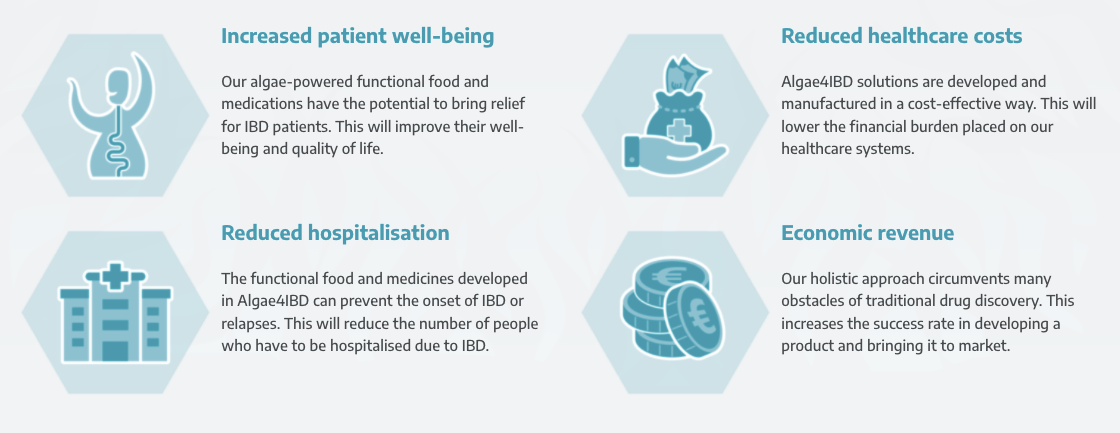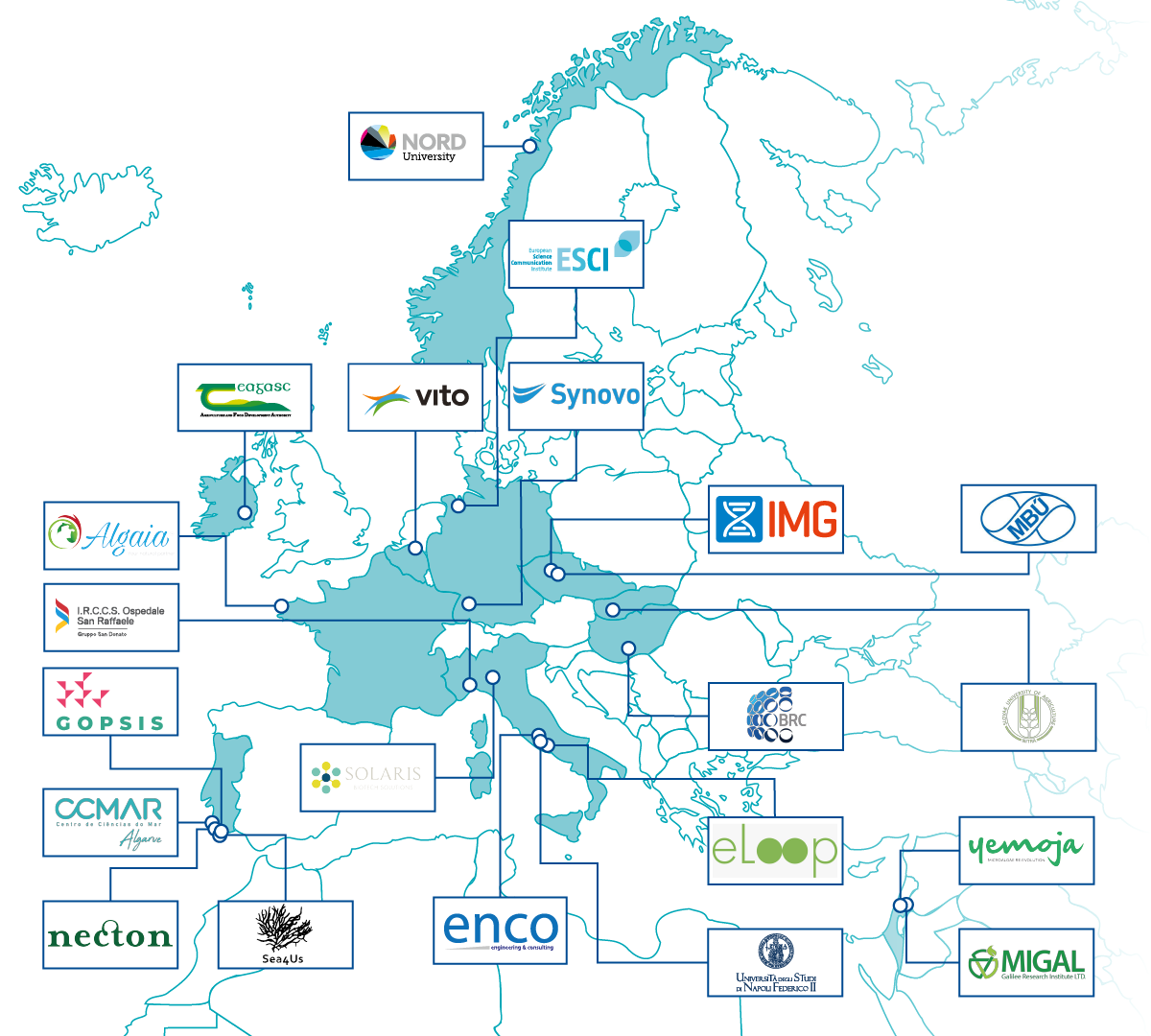Algae has become a hot topic, however there is a knowledge gap that’s resulting in an underused resource that could offer new solutions for the treatment of pain, inflammation, and inflammatory bowel disease (IBD)
The industrial and overall potential of algae is increasingly understood, but most algae are still understudied, and there is an abundance of unknown species yet to be discovered.
It seems as if no problem exists that cannot be solved with the aid of algae. The compounds they produce can be refined into biodiesel, turned into biodegradable packaging, substitute meat, or enrich our diets with supplements.
Algae produce these valuable compounds at low economic and environmental costs. Their inexpensive lifestyle requires light, CO2, and some nutrients. The cost-effective potential of algae has driven their use in the fuel, plastics, food, and cosmetics industry and it could in the future reach other sectors.
The potential of algae: new medicines for inflammatory bowel disease
IBD is a set of diseases which cause chronic inflammation in the bowel, the most common being Crohn’s disease and ulcerative colitis. In all forms of this illness, its resulting bowel injury impairs organ functions and leads to severe pain, fatigue, depression and in some cases colon cancer. These symptoms impair the lives of more than 6.8 million people worldwide and according to estimates this illness is going to affect 8 million people by 2025.
Currently no cure exists, so available therapies focus on mitigating the inflammation and its symptoms. Some of the available treatments also cause side effects. Steroid-based medication leads to sleeping problems and increased appetite. Not every patient responds to treatment, making removal of the affected organ parts their only option for a life with controlled IBD.
What if the solution for a chronic disease lies in our ocean, rivers, or lakes? The EU-funded Algae4IBD project will help answer this question.
Some of the algal compounds can be beneficial for our health. The anti-inflammatory compounds of Chlorella, among other things, make these algae a preferred source for food supplements. Consuming such products could help reduce chronic inflammation. The anti-inflammatory compounds can also serve as a good starting point to develop new therapies against chronic inflammatory diseases.
Scientists expect more algae species to have similar health effects. Dr. Dorit Avni, Algae4IBD coordinator, an expert in immune modulation at the MIGAL Galilee Research Institute in Israel, is one of these scientists. “I think we just started to scratch the huge world of algae,” she says. “We know about some, but algae are a huge untapped reservoir with an infinite opportunity to find novel compounds.”
The hidden medical potential of algae could be used to prevent and treat IBD as Dr. Avni found in her own research. “We found interesting anti-inflammatory compounds from algae that could have higher therapeutic activity than current standard [IBD] treatments.”
“We will address as much as we can because we have a list of bioactivities that could be effective in this disease, the microbiome, inflammation, and pain,” says Dr. Avni about the EU-funded research project, Algae4IBD, she leads. Together with her partners across Europe, she is trying to harness the health potential of algae and develop novel medicines for the treatment of IBD.

Algae4IBD consortium is made up of academic and research institutes, hospitals, as well as companies with expertise in algae cultivation and extraction, food development and pharmaceuticals. It has 21 partners spread over 11 countries, with MIGAL from Israel as the coordinator. The researchers, companies and hospitals involved in the different stages of the project will use the biodiversity of algae, both micro and macro, as a wide source for bioactive compounds using state-of-the-art cultivation and extraction technologies for obtaining bio-active molecules.

Algae enriched food to prevent IBD
Aside from developing new IBD medicines, the researchers from the Algae4IBD project are developing “smart food based on the compounds coming from algae. For example, bread that will be enriched with these relieving compounds,” explains Dr. Avni. “With joint forces for four years, we definitely can provide the research base that will bring us either novel treatment through pharma or functional food.”
Juices with added vitamin C or iron and other trace elements might be the most known enriched food. They are eaten both for a more wholesome diet and to prevent deficiencies. Similarly, scientists hope that consuming foods containing anti-inflammatory compounds help prevent inflammation and IBD which is increasing worldwide.
New, cost-effective health products and medication are important to improve patient’s well-being but also to counteract healthcare costs for IBD, which are going to rise with the increasing disease incidence.
For prevalent Crohns’ disease and ulcerative colitis, today’s annual healthcare costs per patient can surpass U$7000 in Europe, $13500 in North America and $1500 in Asia. Thereby, costs for medication make up the largest part.
The scientists of the Algae4IBD project connected these dots in harnessing the cost-effective health potential of algae to prevent and treat IBD. By mid-2025, they want to deliver their algae-based smart food and medicines.
Algae4IBD proposes innovative solutions to sustainably use algae-based products with improved nutritional quality to positively impact IBD patients.
If successful, this EU-funded project might cause other players in the sector to look for novel therapies in algae, improving the knowledge on this untapped resource. Dr. Bar-Gil from Yemoja ltd, also involved in the project, agrees: “There is a big potential in algae, and I believe that if this project is successful, many countries around the world will start encouraging investment in startups like Yemoja, and better understand the potential that can be found in this industry. Moreover, it will open new business opportunities for algae companies such as Necton, Algaia and Gopsis”.
This project has received funding from the European Union’s HORIZON 2020 Research programme under the Grant Agreement no. 101000501
Please note: This is a commercial profile.
© 2019. This work is licensed under CC-BY-NC-ND.











